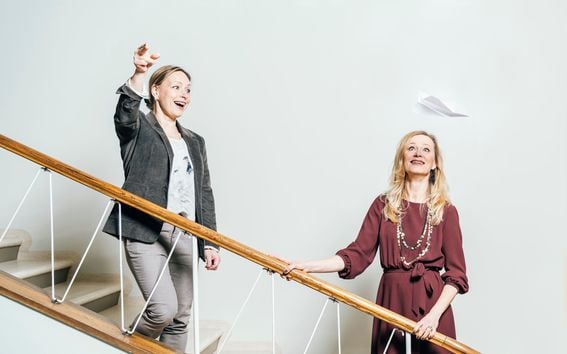Women and networking - career promotion or toasting with sparkling wine?
Unwarranted modesty and fear of being saddled with a debt of gratitude prevent women from networking effectively, new research says.

Mothers in Business, The Women Entrepreneurs of Finland, Aalto Women in Business – there is no shortage of women’s networks focusing on succeeding in work life. Professor Marjo-Riitta Diehl from Aalto University’s Department of Management Studies, and the founder of the Driven Woman network, entrepreneur Miisa Mink would like to see networking become even more common.
‘Finnish women are used to getting things done without complaining. Up here in the North you need to be brave and persistently push through – even if you are knee-deep in snow,’ Mink says.
‘Sure, you need persistence, but women also need room for creativity and peer support. Networks that have a strong feminine energy,’ Mink underlines.
Women’s organisations have a long history in Finland. The umbrella organisation for women’s networks that promote gender equality – The National Council of Women of Finland – was founded already in 1911. It includes 71 organisations and about 400 000 members. Some of its member organisations are traditional women’s networks like the Martha Organisation, but it also has many women’s networks that are focused on work life.
‘Women’s networks concentrating on work life issues are being founded all the time. Women have been particularly good at networking online and during the corona pandemic this trend has strengthened even more,’ Diehl points out.
Women’s work life networking has been studied a lot since the early 2000s. Many studies emphasize that women don’t reap as much benefit from networking as men do.
‘Studies show that women benefit less than men from networking, if benefits are measured as career advancement, increases in pay, and invitations to important events. Researchers have pondered whether the scarcity of women leaders can be attributed to the different ways that women and men network,’ Marjo-Riitta Diehl says.
‘Of course, you can criticize the way that benefits are defined. Women say that above all, networks offer them emotional support and advice. Many women also say that this is exactly what they are looking for from networks,’ Diehl adds.
Miisa Mink, who founded the Driven Woman network in 2013, accentuates that women often look at life as a whole, not separate silos. They see their career as important, but it is still just one aspect of life.
‘In women’s networks, you hear about other women’s struggles and accomplishments. Hearing the success story of someone similar to you often creates a domino effect: I too am going to ask for new challenges at work, and a raise,’ Mink describes.
Diehl and Mink emphasize that many kinds of networks are needed in work environments: networks that are open to all, women’s networks, men’s networks, networks for sexual minorities, networks focused on eliminating ageism, networks for immigrants. There is room and a need for all.
‘Fostering women’s networks is one important way that we can advance gender equality in work life. Networks offer a space where women can share their experiences without being interrupted – and without being challenged to prioritize some other group’s needs,’ Mink highlights.
Many women’s networks or their meetings concentrate on clear themes, such as technical skills, investing, presentations skills, how to handle conflicts, or some current issue.
‘Research shows that women commit more to networks built around specific themes. Women often feel that networking just for the sake of networking is uncomfortable. It is more gratifying to participate in a network that focuses on a specific theme, where the networking comes as a by-product,’ Diehl remarks.
Diehl says that many women appreciate networking opportunities that are arranged during the workday.
‘I was recently speaking to a German women’s network. They said that they always arrange their meetings during lunchtime, so family obligations would not prevent women from participating,’ Diehl mentions.
‘This is precisely what our corporate clients request from us as well,’ Mink concurs. ‘Many women want meetings in the middle of the workday. A women’s network meeting held at the end of the workday won’t work.’
‘Many women also want networks that are meant solely for women, where there will be no masculine energy judging them,’ Mink adds.
Women in the mid-stages of their work careers would benefit most from networks that could help them boost their professional advancement.
‘Women who have just entered work life have not yet hit the glass ceiling, and they don’t find work life particularly unequal. For example, several large consulting firms often have more women than men entering the company in junior positions. But after a certain amount of career development, women disappear from many organsational charts: they are not chosen for leadership positions,’ Diehl says.
‘Exactly. One study conducted in the U.S. revealed that about 50 percent of those women who entered work life with ambition to reach top management say that their ambition and self-esteem plummeted after just two years in work life,’ Mink affirms.
Miisa MinkYou waste talent if women don’t advance in their careers.
Many organisations have been facilitating in-house women’s networks for a long time. However, Diehl and Mink note that they are often not given sufficient resources, or their importance is not recognized. Encouraging women should be seen as an investment.
‘You waste talent if women don’t advance in their careers. Either they remain stuck in positions that they are overqualified for, or they simply leave the organisation. The corona pandemic has increased resignation plans. I work in the UK, where over 60% of professional women are planning a major career change. That’s a staggering figure,’ Mink says.
‘Companies these days don’t have money problems, they have talent problems. Now is the time for companies to wake up and start supporting the career development of all their talent, if they don’t already do so,’ Diehl asserts.
Much needs to be done. According to the Finnish Business and Policy Forum EVA’s Glass Ceiling index, in 2020, the percentage of women leaders in Finland was 37.5%.
‘In top management, the percentage goes down. In 2020 women held 29 percent of all board positions of large Finnish companies. The situation is remarkably better than in 2012, when the percentage was 12, but you cannot call the current situation equal. Furthermore, gender pay gaps are still clear here in Finland,’ Diehl says.
‘Globally, equal pay remains a distant dream. The World Economic Forum estimates that closing the gender pay gap worldwide will take 257 years, if we advance at current speed,’ Diehl adds.
Mink reminds that injustices are corrected only if they are discussed openly and often:
‘The Me Too movement put sexual harassment at center stage. Giving more resources to in-house women’s networks is one way to reduce gender inequality. Things change when women have room to share their experiences and the opportunity to build career paths that suit their needs. Fortunately, companies are recognizing that wasting women’s talent is bad business. A value shift is clearly ongoing.’
Diehl (Ph.D. econ.) has worked as a researcher for example in Switzerland, the UK and Germany. She was appointed professor (associate) at Aalto University’s department of Management Studies in August 2021. Diehl’s research focuses on organisational behavior, for instance justice and fairness in organisations.
Mink (M.Sc. econ) has built an international career in design and branding. She is known internationally especially as the founder of the Driven Woman network. Mink resides in London, but still has strong influence in Finland. The people’s movement Saimaa without mines that Mink founded has over 29 000 participants.
This article has been published in the Aalto University Magazine issue 30 (issuu.com), April 2022.
Go to the Aalto University Magazine page
Text: Joanna Sinclair
Photo: Jaakko Kahilaniemi

Unwarranted modesty and fear of being saddled with a debt of gratitude prevent women from networking effectively, new research says.

According to the new Associate Professor at the Department of Management Studies, fairness and justice are critical to ensuring cooperation and coordination between groups and organizations.



